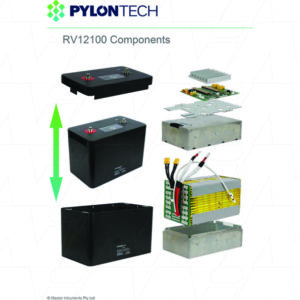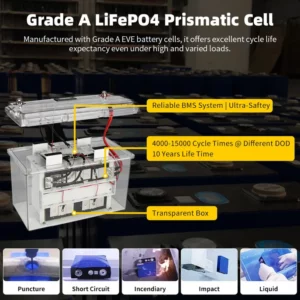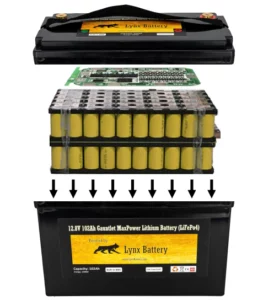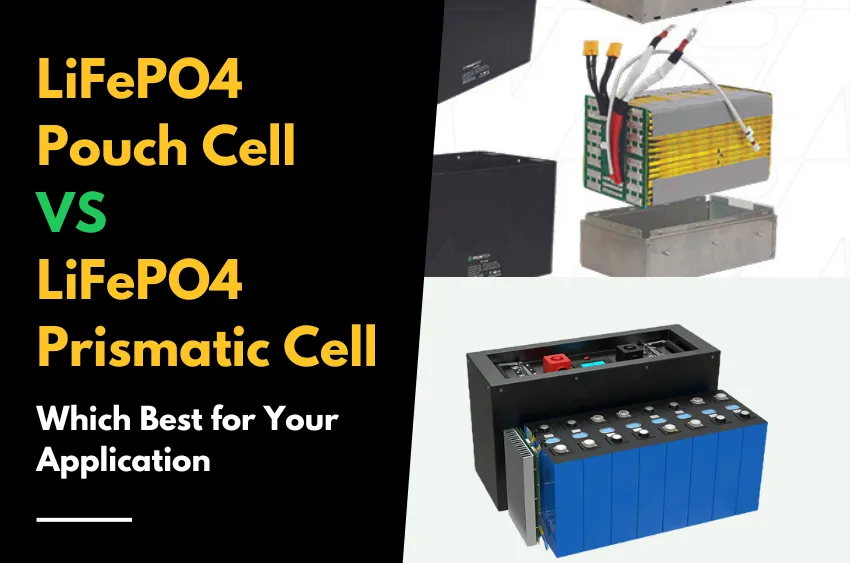Lithium iron phosphate (LiFePO4) batteries are a popular choice for many applications due to their high current rating, long cycle life, thermal and chemical stability, and increased safety compared to other lithium-ion batteries. LiFePO4 batteries come in different cell formats, with the there most common being the prismatic cell, pouch cell and cylindrical cell designs. What are the key differences between LiFePO4 pouch cells and prismatic cells and which one is better for your application?


LiFePO4 Prismatic Cell

LiFePO4 Cylindrical cell
What are LiFePO4 Pouch Cells
LiFePO4 pouch cells get their name from their flexible, foil-type enclosure or pouch. The cathode, anode, and separator layers are stacked or wound together, then sealed in the aluminum-plastic laminate pouch. This creates a flat, flexible soft pack cell ideal for applications where custom shapes and thin profiles are needed.
Advantages of LiFePO4 Pouch Cell
Pouch cells offer advantages like:
• Thin profile – Pouch cells can be as thin as 4mm since they don’t need cylindrical metal casings. This allows efficient use of space.
• Lightweight – The thin flexible pouches weigh less than metal enclosures.
• Adaptability – The pouches can be tailored to fit unique shapes and spaces.
• Cooling – The large surface area of the pouches aids heat dissipation.
Advantages of LiFePO4 Pouch Cells
In addition to their versatile form factor, LiFePO4 pouch cells offer other benefits:
• Safety – The pouches reduce risk of leaks and are resistant to fire or swelling.
• Cost – Pouch cells are often cheaper to manufacture than prismatics.
• Capacity – Pouch cells can achieve higher capacities within the same volume.
• Efficiency – Less materials are needed for the simple flexible pouches.
LiFePO4 Pouch Cell VS LiFePO4 Prismatic Cell
LiFePO4 prismatic cells get their name from their rectangular prism shape. These cells consist of a layered cathode, anode and separator stacked and sealed within a metal casing. The rigid metal casing makes them structurally stronger but less adaptable than pouch cells.
When comparing LiFePO4 pouch cells vs prismatic cells:
– Pouch cells are thinner, lighter and allow more design flexibility.
– Prismatic cells have a more durable metal case and can better withstand vibration or shocks.
– Prismatic cells may be easier for automated production and assembly.
– Prismatic cells are easier to cool due to their metal casing.
– Pouch cells can achieve higher volumetric energy density.
– Prismatic cells may carry a slightly lower cost at very high production volumes.
Application of LiFePO4 Pouch Cell vs LiFePO4 Prismatic Cell
With their differences in mind, here are typical applications where pouch cells or prismatic LiFePO4 cells excel:
LiFePO4 Pouch Cell Applications:
– Wearable devices
– Drones
– Mobile robots
– Medical devices
– IoT devices
– Custom battery shapes
LiFePO4 Prismatic Cell Applications:
– Energy storage systems
– Electric bicycles
– Electric motorcycles
– Automotive
– Power tools
– Solar energy storage
Which is better between LiFePO4 Pouch Cell vs LiFePO4 Prismatic Cell
When choosing between pouch and prismatic LiFePO4 cells, consider your specific application requirements. Pouch cells lend themselves better to low-profile and custom-shaped battery needs where flexibility and light weight are priorities. For applications needing robust structural packing and high-vibration or shock resistance, prismatic cells may be preferred.
Neither format is universally “better” – it depends on your use case. The good news is both pouch and prismatic LiFePO4 offer increased safety and stability over other lithium ion types. By understanding their pros and cons, you can select the right cell design for your battery needs.
Conclusion
LiFePO4 batteries deliver advantages like long cycle life, safe chemistry, and high current ratings. Within the LiFePO4 family, pouch cells and prismatic cells present unique benefits for different applications. Pouch cells provide thin, light, adaptable batteries while prismatic cells offer rigid structural packing. When selecting between the two formats, consider factors like your size, environment, production needs and safety requirements. With the right LiFePO4 cell design chosen for your application, you can reap the rewards of LiFePO4’s reliable performance.

